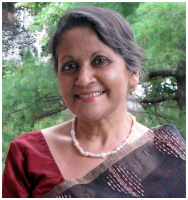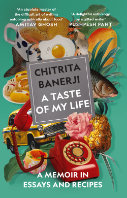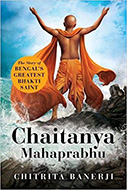In the deserted Cambridge cemetery, the wind cut into me like a scalpel — precise and ruthless — detaching me from my lifelong consciousness of being a cherished child. I trudged uphill until I reached my destination — the crematory beside the chapel. Inside, my mother’s body, in a simple covered casket, lay in front of the incinerator.
Cremation was the natural end for her, a devout Hindu. But in her native Calcutta, she would have been wearing a new sari, her face adorned with fragrant sandalwood paste, her body covered with flowers and wreaths. En route to the crematorium, she would be accompanied by family, friends, and former students. Until the moment when she was placed on the fire, she would be visible. In Calcutta, it is hard to be alone, even in death. In Cambridge, where she had spent the last twenty years of her life, she only had me, her sole child, gazing at a nondescript container with the word “Head” printed at one end and her name at the other. Instead of a new sari she was probably dressed in the blue and white robe she wore the last time I saw her in the hospital.
The crematory attendant said I could spend some time with her — but not too long — before he pushed the casket inside and turned on the switch. I tried to imagine the ferocity of the blaze the switch would generate. In traditional Hindu funerals the body is placed on a wood pyre which is doused with clarified butter that serves as an offering to the gods and also intensifies the flames. In modern Indian crematoriums, electric burners provide a welcome alternative for many. But I had never seen a cremation, wood-fired or electric. Nor did I wish to see it now. Instead, all I could think of doing was to place my hand on the casket where I thought her heart might be and read aloud a chapter from the Bhagavad Gita before saying goodbye for the last time.
The cremation would take several hours. Unable to find a suitable place to sit at the crematory, I decided to go home and continue reading from the text until the process was complete.
The bitter February chill seeped in through layers of warm clothes as I sat on my living room couch and read. I tried to focus on the text, but my eyes kept seeing the fire that was consuming my mother. The Sanskrit verses did offer temporary solace. Nothing, they said, can hurt the soul, neither the sharpest of weapons nor the hottest of flames. Maybe. But it was the reality of the body that haunted me, the body that had brought me forth, the body I had held and touched so often through long years filled with love, laughter, anger, expectation, disappointment, and sorrow — that body was now undergoing a fiery transformation into something unrecognizable. Even a river of tears could not quench that fire and bring her back.
I continued reading. But as I reached a later chapter, I felt the irretrievability of my loss even more deeply. The magnificent verses described how Krishna the deity permitted Arjuna the warrior to see the infinite, malleable, and manifold nature of divinity. In that vision, a thousand flames burned bright and consumed past, present, and future as they rushed toward their fate like rivers to the sea. It was a vision of inhuman beauty that I found unbearable. I had to turn away from the text.
As a child, I had always been fearful of fire until I was old enough to spend time in my mother’s Calcutta kitchen. On this icy night of bereavement, I found myself there again, without knowing how. The flickering blue flames of the gas stove were a welcome vision that evoked her culinary wizardry. I saw her hands, those magician’s hands, making one of my favorite items, the Bengali fried bread called luchi. No one made luchis like my mother. She rolled out little balls of dough into thin disks, while the oil heated in the karai. She picked up the first disk and lowered it into the hot oil with a supremely elegant motion. I watched as the disk puffed up with air and floated in the dark interior of the karai like a full moon sailing in the night sky. She transferred the luchi to a plate and handed it to me. I punctured the thin top layer with a finger and a fragrant steam entered my nose and mouth as I inhaled deeply. I ate the luchi, bit by delicious bit while she rolled out more disks from the dough. When she looked to see if I was ready for another, the only flame I saw was that of the love in her eyes.




